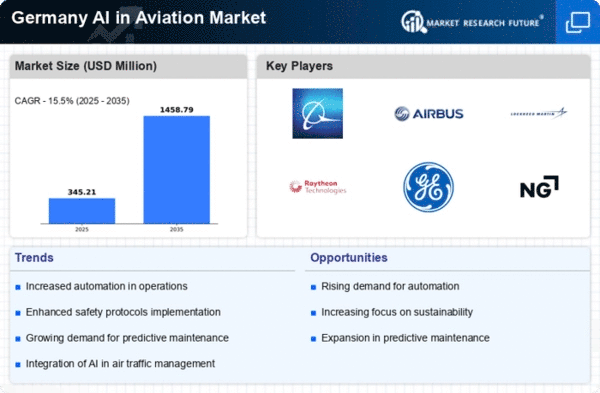Growing Demand for Automation
The increasing demand for automation in the aviation sector is a key driver for the AI in Aviation Market in Germany. Airlines and airports are seeking to streamline operations and reduce costs, which has led to a surge in the adoption of AI technologies. Automation solutions, such as AI-powered baggage handling systems and autonomous drones for inspections, are becoming more prevalent. In 2025, it is projected that the automation segment within the ai in-aviation market could account for approximately 30% of total market revenue. This shift towards automation not only enhances operational efficiency but also improves safety and customer satisfaction, making it a critical factor for stakeholders in the aviation industry.
Focus on Sustainability Initiatives
Sustainability is increasingly becoming a priority in the aviation sector, driving the AI in Aviation Market in Germany. The government and industry stakeholders are focusing on reducing carbon emissions and enhancing fuel efficiency through AI technologies. For example, AI algorithms are being utilized to optimize flight paths and reduce fuel consumption, which aligns with Germany's commitment to environmental sustainability. In 2025, it is anticipated that AI-driven sustainability initiatives could lead to a reduction in emissions by up to 20% in the aviation sector. This focus on sustainability not only meets regulatory requirements but also appeals to environmentally conscious consumers, thereby enhancing the market potential for AI solutions in aviation.
Enhanced Data Analytics Capabilities
The rise of big data analytics is a significant driver for the AI in Aviation Market in Germany. Airlines and airports are increasingly leveraging data analytics to gain insights into operational performance and customer behavior. Advanced AI algorithms can process vast amounts of data, enabling stakeholders to make informed decisions that enhance efficiency and service quality. In 2025, it is expected that the data analytics segment will contribute to approximately 25% of the overall ai in-aviation market revenue. This capability allows for real-time monitoring and predictive insights, which are essential for optimizing operations and improving the passenger experience. As data analytics continues to evolve, it is likely to play a pivotal role in shaping the future of the ai in-aviation market.
Regulatory Support for AI Integration
The AI in Aviation Market in Germany benefits from robust regulatory frameworks that encourage the adoption of artificial intelligence technologies. The German government has been proactive in establishing guidelines that facilitate the integration of AI into aviation operations. This regulatory support is crucial as it not only ensures safety and compliance but also fosters innovation. For instance, the European Union Aviation Safety Agency (EASA) has been working on regulations that promote the use of AI in air traffic management and maintenance. This creates a conducive environment for companies to invest in AI solutions, potentially leading to a market growth rate of around 15% annually. As regulations evolve, they are likely to further enhance the operational capabilities of the ai in-aviation market, making it a focal point for technological advancements.
Investment in AI Research and Development
Investment in research and development (R&D) is a significant driver for the AI in Aviation Market in Germany. The country is home to numerous research institutions and universities that collaborate with aviation companies to develop cutting-edge AI technologies. In 2025, it is estimated that R&D spending in the aviation sector could reach €1 billion, with a substantial portion allocated to AI initiatives. This investment not only accelerates innovation but also enhances the competitiveness of German aviation firms on an international scale. Furthermore, partnerships between academia and industry are likely to yield breakthroughs in AI applications, such as predictive analytics and machine learning algorithms, which are essential for improving operational efficiency and safety in the ai in-aviation market.
















